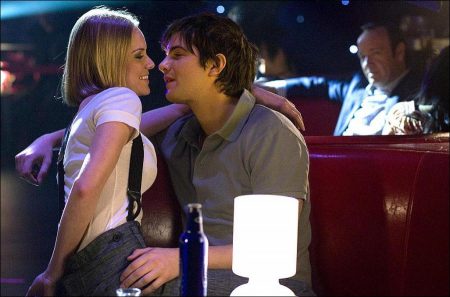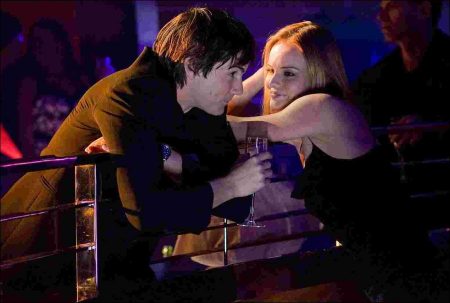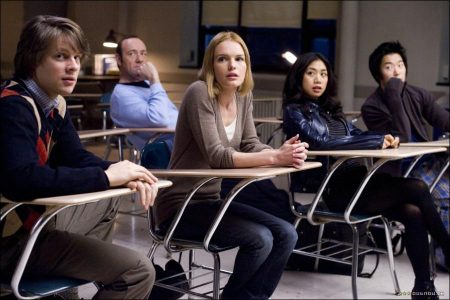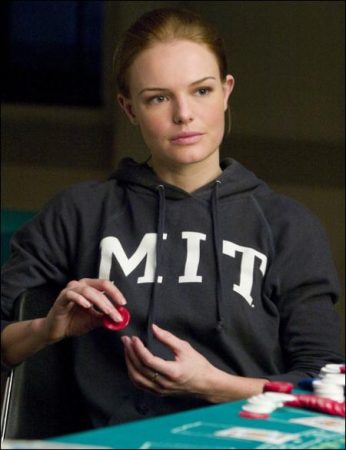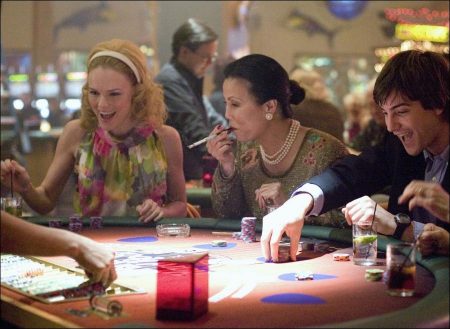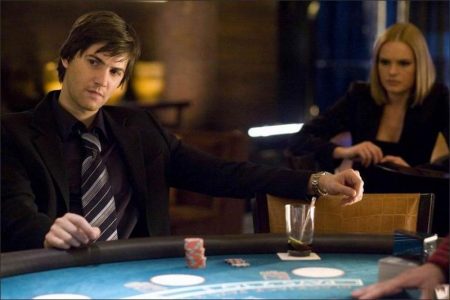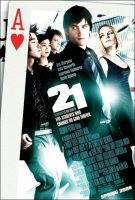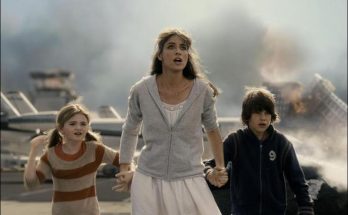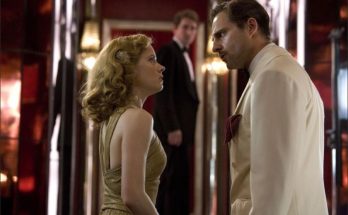Tagline: Inspired by the true story of five students who changed the game forever.
“21,” based on Ben Mezrich’s best-selling nonfiction book “Bringing Down the House: The Inside Story of Six M.I.T. Students Who Took Vegas for Millions,” revolves around a group of young men who become experts in the art of card counting.
Ben Campbell is a shy, brilliant M.I.T. student who — needing to pay school tuition — finds the answers in the cards. He is recruited to join a group of the school’s most gifted students that heads to Vegas every weekend armed with fake identities and the know-how to turn the odds at blackjack in their favor. With unorthodox math professor and stats genius Micky Rosa (Kevin Spacey) leading the way, they’ve cracked the code.
By counting cards and employing an intricate system of signals, the team can beat the casinos big time. Seduced by the money, the Vegas lifestyle, and by his smart and sexy teammate, Jill Taylor (Kate Bosworth), Ben begins to push the limits. Though counting cards isn’t illegal, the stakes are high, and the challenge becomes not only keeping the numbers straight, but staying one step ahead of the casinos’ menacing enforcer: Cole Williams (Laurence Fishburne).
21 is a 2008 American heist drama film directed by Robert Luketic and starring Jim Sturgess, Kevin Spacey, Laurence Fishburne, Kate Bosworth, Liza Lapira, Jacob Pitts, Aaron Yoo, and Kieu Chinh. The film is inspired by the true story of the MIT Blackjack Team as told in Bringing Down the House, the best-selling book by Ben Mezrich. Despite its largely mixed reviews and controversy over the film’s casting choices, 21 was a box office success, and was the number one film in the United States and Canada during its first and second weekends of release.
In its opening weekend, the film grossed $24,105,943 in 2,648 theaters in the United States and Canada, averaging $9,103 per venue and ranking first at the box office. The film was also the number one film in its second weekend of release, losing 36% of its audience, grossing $15,337,418, expanding to 2,653 theaters, and averaging $5,781 per venue.
The film dropped to third place in its third weekend, losing 32% of its audience, grossing $10,470,173, expanding to 2,736 theaters, and averaging $3,827 per venue. By the fourth weekend it fell to sixth place, losing 47% of its audience, grossing $5,520,362 expanding to 2,903 theaters, and averaging $1,902 per venue. By the end of its theatrical run, the film grossed a total of $157,802,470 worldwide — $81,159,365 in the United States and Canada and $76,643,105 in other territories, against a budget estimated at $35 million.
How Card Counting Works
In 21, the spotters play low-wager bets, counting the cards and waiting for the deck to become hot – the more face cards left in the deck, the hotter the deck is. Once a face card is played, the spotters score it -1. Cards 2 through 6 are +1. 7, 8, and 9 are neutral and have no value.
Once the deck is hot, the spotters cross their arms to signal the big player. He comes in, flashes his cash, and makes high-wager bets on the hot deck, leaving and bouncing to another table when the cards are shuffled. The spotters signal the big player by speaking in code to let him know what the count is:
+1 = Tree +10 = Bowling
+2 = Switch +11 = Football
+3 = Stool +12 = Eggs
+4 = Car + 13 = Witch
+5 = Glove +14 = Ring
+6 = Gun +15 = Paycheck
+7 = Craps +16 = Sweet
+8 = Pool +17 = Magazine
+9 = Cat +18 = Voting Booth
For example, if the count is +15, a spotter might give the big player a clue by pretending that he has lost money at the table, saying, “I’ve blown my whole paycheck. My girlfriend is going to kill me.”
If a spotter needs to talk to another team member, the signal is to touch the eye. If the spotter sees that the big player has lost the count, the spotter can signal that the deck is cooling with a hand to the forehead. And if a team member sees that the dealer, or the pit boss, or security has figured out what’s going on, the signal is fingers through the hair: Get. Out. Now.
About the Film
“Who wouldn’t want to go to Vegas and make a killing, not because of luck, but because you’re smart about it?” asks Kevin Spacey, describing the appeal of the story behind 21. Spacey says that though it seems like fantasy wish-fulfillment, in fact the film is inspired by a real group of M.I.T. students in the 1990s. “I loved the juxtaposition between these kids’ lives in Boston – where they were geeks with pencils in their pockets – and the lives they make for themselves in Vegas, where they can become anybody they want to be.”
“You can become anyone you want in Vegas,” says Robert Luketic, who directs the film. “M.I.T. geniuses become rock stars. They’re given the keys to Las Vegas. They have access to things that most of us can only dream of.”
Long ago, Spacey’s producing partner, Dana Brunetti, had heard the rumors about the M.I.T. math gurus who had used their skills for a very concrete purpose: they had figured out how to beat the odds at blackjack and take the Vegas casinos for millions. “Ever since I started playing blackjack, I’ve been fascinated by the fact that it’s beatable,” says Brunetti. “Then, by chance, a friend of mine was having dinner with a guy who used to be a card-counter on an earlier team. I thought right away that it was a great idea for a movie.” Brunetti knew that the story would interest Spacey, “but it didn’t go anywhere until Ben Mezrich wrote his story for Wired magazine.”
Mezrich’s article appeared in the September 2002 issue of Wired. As it chronicled the budding geniuses at M.I.T. who had beaten Vegas at its own game, Mezrich’s tale had everything – featuring high stakes action, incredibly close calls with Vegas security staff, and the up- and downsides of a glitzy, glamorous Vegas lifestyle, Mezrich’s article was a true story that read like a Hollywood thriller. Immediately struck by the possibilities, Brunetti contacted Mezrich, but the author’s first impression was that one of the students was playing a prank (something that would not be out of character for an M.I.T. student).
“This guy calls me up and says, ‘Hi, I’m Dana Brunetti, and I have Kevin Spacey on the line.’ Yeah, right. I take down his number and say I’ll call him back. So I Google ‘Dana Brunetti’ – and he really is working with Kevin Spacey!” Brunetti and Spacey had soon locked up the rights to the article.
Coincidentally, Luketic also read the Wired story and thought it would be a great movie. “I’d just gotten back from touring Europe to support Legally Blonde and was looking for my next project. I read in Wired magazine about a team of brilliant M.I.T. students who’d beaten the house in Vegas – but when I called, I found out that Kevin Spacey had already bought the project. Years passed, but then a script landed on my desk and it all came back to me. I guess it was meant to be.”
Producer Michael De Luca explains that the book taps into everyone’s Vegas dream of beating the house. “I’ve always been a blackjack fan,” he says, “so after I read the book, I tried to pick up the counting method from the book. It’s hard for someone who’s not a math genius, but it’s infectious. The few times you get the count right and you hit a hand for a lot of money, it feels really good.”
When Mezrich’s book hit the shelves, it became a phenomenon, staying on the bestsellers list for 59 weeks and moving 1.5 million copies. Translated into twelve languages, the book continues to enjoy strong sales.
In order to adapt Mezrich’s nonfiction book into a movie, the filmmakers made certain changes to the story, but the filmmakers point out that their dramatic license doesn’t change what has made the book so popular. “This is a fun movie – it’s not meant to be a docudrama,” says Dana Brunetti. “We made some changes to the real story in order to make it work as an entertaining movie. We set the movie in the present time and added a romantic element. But we never touched the heart of what made the story so exciting: the tense action, the high stakes, using fake identities and bravado to rise to the top in the fast-paced world of Vegas, beating the house and making millions. That’s what the book is, and that’s what the movie is, too.”
The book and the movie are both inspired by the experiences of Jeff Ma, who was a student at M.I.T. in the mid-1990s when he was recruited to join the blackjack team. Though Ma and his teammates were some of the brightest minds in the country, to succeed with the team, they would require something else. “I think the real reason that I was recruited to join the team was because they thought I would be good at it, not just because of my intelligence, but because of my demeanor and my ability to go into a casino and sell myself,” he says.
While on the M.I.T. team, Ma was the big player; once his teammates, called spotters, had found a hot deck, Ma would sit down and play very high wagers with the odds in his favor. Ma says that he had to overcome the natural parts of his personality to play the big player convincingly. “There was always the fear, rational or irrational, that we would get caught,” he says. “I’m the type of person that doesn’t like to get yelled at by anyone. So regardless of whether the casinos have any ability to cause you physical pain, that fear is always in the back of your mind.”
The M.I.T. team changed Ma’s life, not only while he was on the team, but for the future as well. “I think a lot of people work at jobs they don’t really like to earn a paycheck,” he says. “Because of blackjack, I’ll never have to take a job like that. I had enough money that I could do what I wanted to do – coach water polo, and then start a sports company. I’ll never have to take a job that I don’t enjoy purely for the money. That’s the greatest gift that blackjack gave me.”
Ma is no longer allowed to play blackjack in most casinos in Las Vegas – though the casinos welcome him at other games, he can’t play his best game. For Ma, the thing he misses most isn’t the blackjack, but being part of the team. “We were a group of 10 or 20 kids – literally kids, 21 years old – managing a multimillion-dollar company, trying to make it work and trying to make more millions. I miss that camaraderie.”
To direct the film, the producers looked to Robert Luketic. Producer Michael De Luca says that he, Brunetti, and Spacey were attracted by Luketic’s vision for the film. “21 spans many genres, many tones,” he says. “It’s a suspense film with action, comedic, and romantic elements, and it’s inspired by true events. Even with all of those balls in the air, Robert was able to balance it into one unified vision.”
“I had directed several romantic comedies and was eager to try something different,” says Luketic. “With everything that 21 had to offer – high stakes tension, close calls, and the fantasy-come-true of giving Vegas a taste of its own medicine, it seemed like a tremendous opportunity.”
Kate Bosworth, who previously worked with Luketic on Win a Date with Tad Hamilton, says, “He’s created this incredible balance of being extremely professional and serious when he needs to be, but really he’s just a little kid at heart. I love that! I really feel like people with that kind of personality often make the best films because they make it fun.”
She continues, “Robert has a great sense of humor. I feel like I can try anything when I’m with Robert and that’s not something I can say for everybody.”
Continue Reading and View the Theatrical Trailer
21 (2008)
Directed by: Robert Luketic
Starring: Kevin Spacey, Laurence Fishburne, Kate Bosworth, Liza Lapira, Josh Gad, Jim Sturgess, Masi Oka, Sam Golzari, Jacob Pitts, Helen Carey, Jack Gilpin, Donna Lows
Screenplay by: Peter Steinfeld, Allan Loeb
Production Design by: Missy Stewart
Cinematography by: Russell Carpenter
Film Editing by: Elliot Graham
Costume Design by: Luca Mosca
Art Direction by: James F. Truesdale
Music by: David Sardy
MPAA Rating: PG-13 for some violence, and sexual content including partial nudity.
Distributed by: Columbia Pictures
Release Date: March 28, 2008
Visits: 108
